Review: Is She the Greatest Star? Beanie Feldstein Leads Funny Girl Back to Broadway
Feldstein steps into the shoes of Barbra Streisand in this first-ever revival of the classic musical comedy.
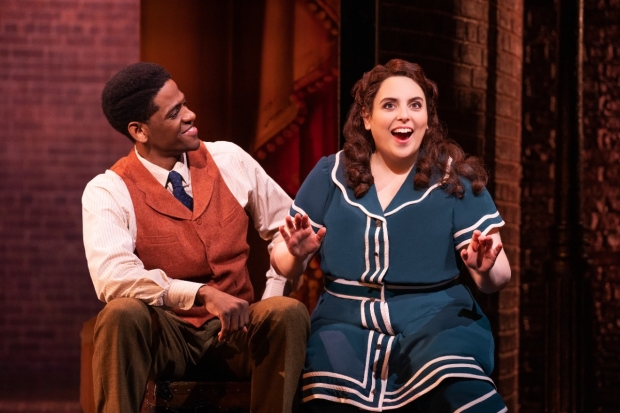
(© Matthew Murphy)
If Broadway were an Olympic sport, Funny Girl — Fanny Brice, more specifically — would be the trick only the most reckless athletes dare attempt. Like Tony Hawk's 900 or Simone Biles's Yurchenko double pike, following in the trail-incinerating footsteps of Barbra Streisand has settled into Broadway's collective consciousness as an act of near-insanity with only two options: Legendary success or bone-crushing failure. It's the main reason Isobel Lennart, Jule Styne, and Bob Merrill's hit musical, which received eight Tony nominations in 1964 and just as many Oscar nominations for the film version in 1969, hasn't been back to Broadway in 58 years.
So here we finally are. In the year of our lord 2022, a revival of Funny Girl has opened on Broadway at the August Wilson Theatre (on Streisand's 80th birthday no less), with spunky, affable, girl-next-door Beanie Feldstein plucked by director Michael Mayer to attempt the death-defying stunt of convincingly embodying "the greatest star." Now for everyone's burning question: Is it legendary or bone-crushing? The answer, in short, is neither — a dissatisfying conclusion for those who have eagerly anticipated either fireworks or flames. But perhaps knowing that Funny Girl is capable of being middling with a few precious high points could finally lift the veil of mythology from this untouchable property.
Of course, Funny Girl is one of the few shows where a middling lead performance dents the plot. Feldstein entertains with her wide-eyed, goofy antics, mugging to the audience at every turn and hitting all the "oys" in her Yiddishisms with extra gusto in her wandering Brooklyn accent. It's broad and campy, and often succeeds in landing the laugh. Her shtick, however, feels more grasping than authentically character driven.
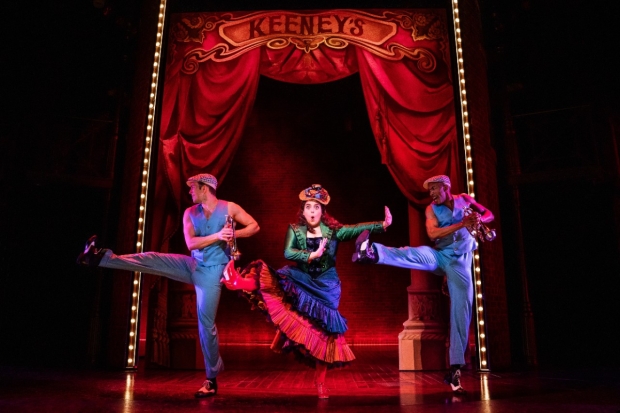
(© Matthew Murphy)
Fanny Brice — a famous comedian, singer, and actor of the early 1900s — is framed in the musical as an unlikely but ultimately destined star. Raised in a Brooklyn saloon by Jewish immigrants (the very much not Jewish Jane Lynch plays her mother Rosie with plenty of Brooklyn shtick herself, but is more consistent and convincing in her comedy), Fanny has neither the glamor nor comportment for traditional stage roles. But a combination of persistence, outsize confidence, and irrefutable talent lands her at the center of the Ziegfeld Follies. What we should be seeing onstage is a fish in water — a girl proven worthy of every crumb of ego she touts the moment she steps into lighting designer Kevin Adams's spotlight. What Feldstein instead shows us is a talented performer working overtime to land the next bit. She may succeed, but seeing her reach for the bar only exposes the fact that she's not soaring over it.
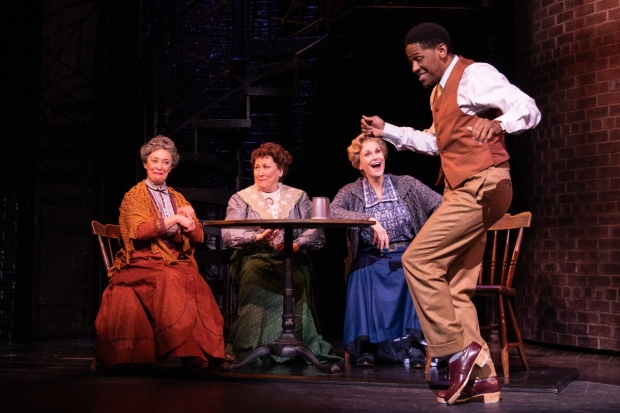
(© Matthew Murphy)
Feldstein's vocal performances land in similar territory: capable but controlled. Her singing is lovely (and sound designer Brian Ronan successfully sends it to the balcony), but the growling jazz number "Cornet Man" sounds just as pretty as the vulnerable ballad "People." Mayer has Feldstein stand at the top of a ladder for a large portion of Fanny's famous "I Want" song, "I'm the Greatest Star," as if to give her more physical space to encompass (David Zinn's attractive but cramped set, opening in the center like a time capsule, almost seems to offer its star a more condensed space in which to operate). Height, however, can't create the explosion of pent-up yearning that the song needs, and what we get is levitated stagnation. What's ultimately lost in this vice grip on performance is the fascinating dichotomy between Fanny, the unmatched performer, and Fanny, the self-doubting woman willing to surrender her cherished superpower for a man who simply finds her beautiful.
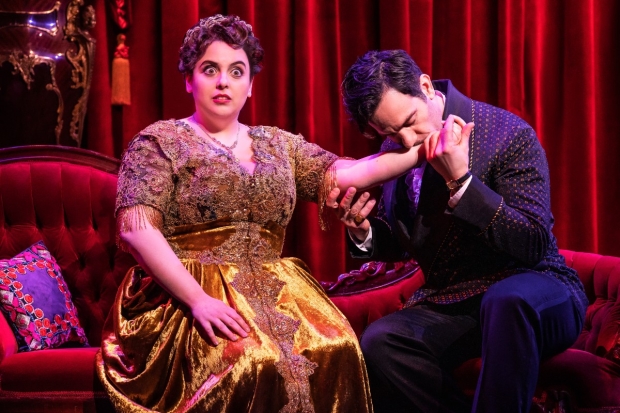
(© Matthew Murphy)
Ramin Karimloo is perfectly cast as Nick Arnstein, the gorgeous but slippery gambler who makes Fanny a "Sadie, Sadie, married lady." Their chemistry is not exactly palpable but their cat-and-mouse game in "You Are Woman, I Am Man" makes for some of the show's most entertaining physical comedy. Karimloo and Feldstein also beautifully duet to "Who Are You Now?" — traditionally a Fanny Act 2 solo but now a shared reprise of the song Fanny sings at the very top of the show as she remembers all these shadows of the past. It's one in a handful of updates Harvey Fierstein has made to Lennart's book that reinforces Fanny's place as our storyteller in this memory play. It simultaneously requires the tectonic shifts in Fanny's character between these clearly marked bookends to be discernable by an audience. Most, unfortunately, are hidden by either quirky tics or far-off wistful gazes at nothing in particular (Susan Hilferty's costumes often feel underwhelming but they effectively trace Fanny's growth into maturity, from loose and childish to cinched and womanly).
But lest we forget, Funny Girl is not a one-woman show. Jared Grimes, in fact, steals all of his scenes as Fanny's friend and collaborator Eddie Ryan, performing Ayodele Casel's exhilarating tap choreography with ease and style. Casel shares choreographing duties with Ellenore Scott, whose traditional musical theater numbers like "Henry Street," featuring a fantastic ensemble of dancers, bring you back to the joyful aesthetic of Golden Age musicals.
From the trumpeted tones of "Nick-y Arn-stein" at the top of the overture (only be rivaled in renown by the "I-had-a-dream" horns at the top of Jule Styne's other masterpiece, Gypsy), it's hard not to be sucked into the heart-swelling world of classic Broadway by Funny Girl. But after 58 years of such hesitant planning, you'd think somebody would have heeded the warning of Henry Street's favorite yenta. "Listen, Fanny," Mrs. Strakosh says, "when you were a child, you made with the funny faces, the audiences loved you…it was cute." "My condolences," Rosie replies to Fanny. "You are no longer cute."
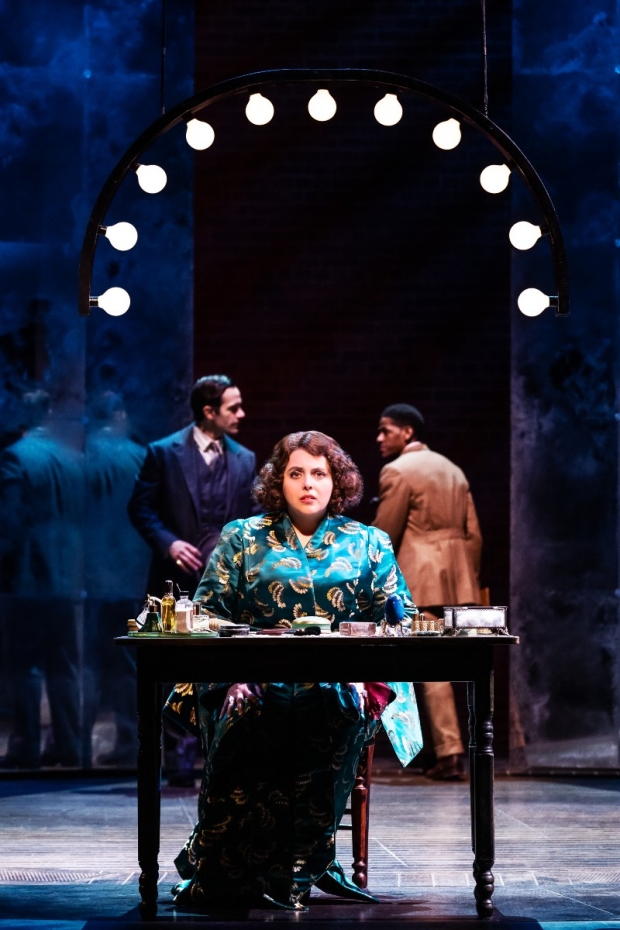
(© Matthew Murphy)









